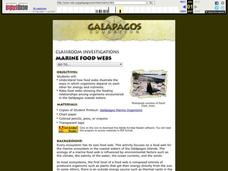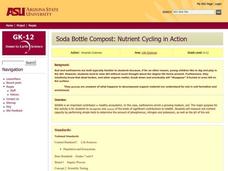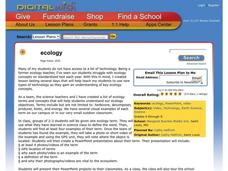Curated OER
Nature's Recycling Program
Students identify what materials make up compost. In this science of recycling lesson, students explain the benefits of composting determine how compost is a good plant fertilizer.
Curated OER
The Gaia Hypothesis: An Approach to Problem Solving in the Environment
Learners are introduced to the Gaia hypothesis by examining a conceptual sketch. In groups, they analyze the way they can use Dewey's method for problem solving to solve problems within the environment. They are given a problem facing...
Curated OER
Eutrophication Experiments
Observe two different water samples and write down observations. Write a paragraph which predicts the relative amounts of nutrients, nitrates, and phosphates in the water samples. Compare water samples under a microscope.
Curated OER
Nutrition and Energy Flow
In this energy flow worksheet, students will complete 10 short answer questions based on a food web diagram. Then students will review different cycles in nature including the water cycle, carbon cycle, and energy cycle. This worksheet...
Curated OER
Marine Food Webs
Students examine how food webs illustrate the ways in which organisms depend on each other for energy and nutrients, and make food webs showing the feeding relationships among organisms encountered in the Gal??pagos coastal waters.
Curated OER
Food Web Follies
Seventh graders cut and paste animal pictures to create a food web and trace the path of energy. They write a paragraph explaining the importance of photosynthesis in all food webs.
Curated OER
Pond Life Identification Kit
Learners explore ecology and biodiversty. They use the wet-mount procedure to make several slides to view using the microscope and draw what they see.
Curated OER
My Habitat Address
Sixth graders draw a habitat and write about what they would need to survive in the habitat. They define the input of items such as materials, energy, and information, and what goes out of the habitat. They play a "Habitat Address" game,...
Curated OER
Chewin' in the Chesapeake
Students examine a web page on food webs and select a habitat to research. In this research lesson plan students identify the organisms found in the food web and present their findings to the class.
Curated OER
Connect the Species
Fourth graders, in pairs, explore energy transfer and species interrelationships by viewing slides on a microscope. hey explore phytoplankton (producers) and zooplankton (consumers)
Curated OER
What's For Dinner?
Students explore the food chain. They brainstorm and create a consumer-consumed food chains using magazine pictures and research materials. Students identify consumer-consumed relationships.
Curated OER
Freshwater Macroinvertebrates
Students identify and count Macroinvertebrates at a Hydrology website. For this macroinvertebrates lesson students collect, sort and identify Macroinvertebrates.
Curated OER
Fungus Among Us- Non-Fiction Reading Comprehension Worksheet
In this fungus non-fiction reading comprehension activity, students read a 3 page selection that describes the characteristics and life of fungi. They answer 10 questions based on the reading which include true or false, multiple choice,...
Curated OER
Water Quality and Dissolved Oxygen
Students investigate the relationship between dissolved oxygen and organic materials and aquatic organisms. This is a 3-lesson series in which students explore dissolved oxygen and then design an experiment testing the effects of changes.
Curated OER
How do plant & animal cells make and use energy?
Students show the relationship between the need for plants to undergo photosynthesis in order to generate oxygen. They see the flaws associated with this thinking because of the lack of CO2 and H2O and lack of sufficient gravity in order...
Curated OER
Scales, Scutes, and Skins
Students identify the various adaptations of reptiles and amphibians. After distinguishing between reptiles and amphibians, students discuss the ways in which their adaptations aid in their survival. They participate in a hands on...
Curated OER
Fun Photosynthesis
Second graders, using large colored poster board, explore photosynthesis and its effect on the food chain and survival of organisms.
Curated OER
Ecology and The Endangered Species Act
Learners listen to a lecture about the basics of Ecology. They take a field trip in which they observe a specific organism and their characteristics.
Curated OER
Soda Bottle Compost: Nutrient Cycling in Action
Students investigate, through their own experimentation, the important role wildlife play in nutrient cycling. Earthworms and compost are used in this experiment and different experimental setups be evaluated.
Curated OER
Food Chains Are Not A Necklace!
Second graders examine how food chains interact with different plants and animals. They practice using new vocabulary. They also discover the role of pesticides in the environment.
Curated OER
Food Web
Students are able to define food web, and identify the interdependence of organisms within a system. They are able to describe how natural events and human activities can impact a food web.
Curated OER
THE FARMER CARES FOR THE LAND
Young scholars will identify cause and effect relationships in issues relating to Agriculture and the environment.Ask students to describe what farmers do. Then ask young scholars to define the word "environmentalist." Ask students if...
Curated OER
Ecology
Students research ecology terms, define the terms, given examples of the term, and present the term to the class. In this ecology terms lesson plan, students use PowerPoint to present their term.
Curated OER
Prairie Tic-Tac-Toe
In this prairie organisms worksheet, 8th graders name the role of 18 prairie organisms and tell if they are a biotic or abiotic factor. The organisms include plants and natural forces such as wind and fire.

























